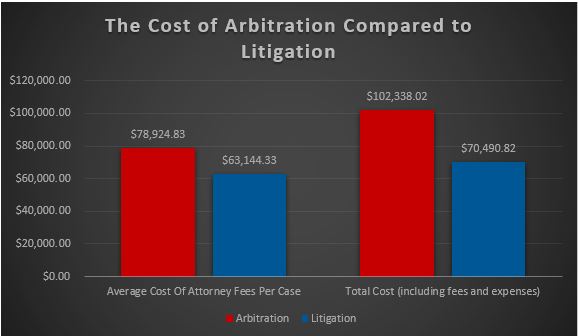
Best Ohio
Employment Discrimination Attorney Answer: Who pays the bill if I have to go to arbitration
with my employer? How much will it cost if my employer files for arbitration? Can
my employer force me to split the cost of arbitration?
Often a potential new client will come through our
does saying, “I was fired today because of my…” race/color, religion, gender/sex, pregnancy, national
origin,
age, or disability. The employee may say “I want to sue
for wrongful
termination” or that “my boss is sexually harassing me.” Most every employee envisions taking
the stand in front of a jury to tell their story and get vindication. Our employment law lawyers spend time with the client
gathering all the facts and drafting a noticing of claims threatening to file a
lawsuit. But, then the employer responds by pointing to an arbitration
agreement that the employee did not realize that he or she signed on their
first day of employment. So now what? Will arbitration be too expensive to
pursue the claims and who has to pay for arbitration?
At Spitz, The Employee’s Law Firm, we have frequently discussed
the topic of arbitration. (See Can My
Employer Force Me To Arbitrate Overtime Claims? I Need Help From The Best
Employment Lawyers And Top Wage Violation Attorneys In Ohio!; Can I Sue My
Employer If I Signed An Arbitration Agreement? Best Employment Discrimination
Lawyer Help In Ohio!; How Do I Get
Out Of My Employer’s Arbitration Clause? I Need The Top Employment Attorney In
Ohio!)
One aspect of the arbitration process that our
employment lawyers have not yet discussed is the cost. Surprise! It is
expensive, costing discriminating employers on average $100,000+ per dispute.
Now, that’s a lot of dough! There is a myth floating around the legal community
that arbitration is a cheaper, faster, and more efficient option than taking a
case to trial. However, a hard look at the numbers shows that arbitration costs
more and may take longer than traditional litigation.
Thankfully, most of our clients do not need to worry
about the potential cost of arbitration as Ohio courts have recognized that
mandatory arbitration agreements that require employees to split the cost of
arbitration are unenforceable in many instances. For example, in Eagle v. Fred
Martin Motor Co., 9th Dist. 157 Ohio App.3d 150 (2004), the court cited the Sixth
Circuit Court of Appeals‘ decision in Morrison v. Circuit
City Stores, Inc. (C.A.6, 2003), 317 F.3d 646. In Morrison, the court consolidated two
cases brought by former employees who sued
their employers for discrimination. Both employees had been required to sign a mandatory arbitration
agreement as a condition to their employment. The two employees challenged the enforceability of their arbitration clauses. In reaching its decision the court found the “cost-splitting” provision in one of the arbitration clauses to be unenforceable. The court stated that “[a] cost-splitting provision should be held
unenforceable whenever it would have the ‘chilling effect’ of deterring a
substantial number of potential litigants from seeking to vindicate their
statutory rights.” Morrison at 661.
Further,
many large arbitration providers including the American
Arbitration Association (AAA), and
the Judicial
Arbitration and Mediation Services (JAMS) have
policies that shift the costs of arbitration to the employer. These
organizations only require an individual to pay a small filing fee, usually
around $300, if the individual is the one who files for arbitration.
On the
other hand, if an employer decides to move forward with arbitration, they
better be ready to pay a pretty hefty bill. Even the courts have recognized the
potential extra expense to employers of arbitration. As the Morrison
court pointed out, courts “do not charge extra for in-person hearings,
discovery requests, routine motions, or written decisions, costs that
are all common in the world of private arbitrators.”
According to a recent survey in the online periodical Inside
Counsel, discussed here, arbitration is not the most cost-effective way for
parties, especially corporations to settle disputes when compared to the cost
of litigation. According to the survey the total cost for arbitrated cases ran
about $100,000 per case. Compare this to the average cost of litigated matters,
which cost companies approximately $80,000 per case. Let’s take a moment to
break these costs down.
The fees paid to arbitrators and arbitration
corporations make up a significant portion of overall arbitration costs. For
example, AAA charges an
employer
anywhere between $1,900 and $2,800 just to file the case, as well as a case
management fee ranging from $750 to $1,000. Similarly JAMS charges $1,500 to file for
arbitration as well as a 12 percent case management fee. Those fees do
not cover the arbitrator’s compensation costs which according to some sources may range from $1,000 to as high
as $2,000 per day! Although low-cost options do exist, these budget arbitrators are rare and are usually
available only when parties can demonstrate a financial need. Even these
low-cost arbitrators charge a minimum of $150 a day and may range up to $750.

Add to these filing and
arbitrator’s fees the cost of renting the hearing room (which can cost hundreds
of dollars a day), as well as the arbitrators expenses, including travel and
various other miscellaneous expenses, and the costs relating to documents and
witnesses produced at the direction of the arbitrator, which must be covered by
the employer, and these costs add up quickly! According to one management-side firm, the “case
management fees,” “hearing time fees,” and “post-hearing retainer” charged by
some large arbitration providers could exceed $40,000. Can you imagine paying
$40,000 just to the arbitration company? I sure am glad our employee clients
don’t have to bear this cost.
While the
fees charged by arbitration companies are certainly substantial, they make up
only a small percentage of the total costs of arbitration. According to Expert-Evidence.com, attorney
fees make up 83 percent of the cost of arbitration. While companies may think
that they are paying the same attorney fees whether the case goes to
arbitration or litigation studies have found that the attorneys’ fees for
arbitration are actually higher than the fees charged for litigation.
In the article, Is Mandatory
Employment Arbitration Living Up to Its Expectations? A View from the Employer’s
Perspective. (Charles
D. Coleman, 25 A.B.A. J. Lab. & Emp. L. 227 (2009-2010), the author cited a
large company’s internal survey where the employer tracked their expenses for
19 employment discrimination claims, 10 of the 19 claims to proceed to
litigation and the remaining nine went to arbitration. The survey found that;
The
total outside counsel fees for the nine arbitrated cases amounted to
$710,323.50. The total outside counsel fees for the ten litigated cases were
$631,443.38. This means that the average attorney fees for an arbitrated case were
$78,924.83, and the average attorney fees for a litigated case was $63,144.33.
The range of the outside counsel fees for the arbitration cases was $11,462.50
to $283,583.45, and the range for the litigation cases was $5,846.75 to
$215,977.70. This study found that the attorneys’ fees charged by outside
counsel for the nine arbitration cases cost the employer $78,880.12 more than
the attorneys’ fees charged for the ten litigation cases.
Further, when you subtract the average attorney fees for a litigation case
($63,144.33) from the average attorney fees charged for an arbitration case
($78,924.83) you find that the average arbitration case cost the company
$15,780.50 more than the average litigation case just in their own attorneys’
fees.
So,
lets recap, an employer may have to fork over as much as $40,000 to an
arbitration company in costs and fees, and then pay attorney fees for the
arbitration.
When arbitration costs were added to the attorney fees
discussed above the total costs for the
nine arbitrated cases jumped to $921,042.22, an increase of $210,718.72! On the
other hand, the total cost for the ten litigated cases was only slightly higher
than the initial attorney fees. The employer paid a total of $704,908.20 for
litigating ten cases, an increase of $73,464.82. This means that the average
total cost of an arbitrated case was $102,338.02 while the average cost for a
case to be completely litigated was only $70,490.82. This indicates that it was
$31,847.20 cheaper to arbitrate cases! To help get a better picture check out
the graph below.

The heightened cost of arbitration impacts companies
of all sizes. Mandatory Employment Arbitration Living Up to Its Expectations
cited a 2008 survey of senior corporate counsel in the United States, which
found that “among the largest companies, 23 percent spent an average of between
$50,000 and $100,000 arbitrating each employment dispute, and 19 percent spent
$100,000 or more per dispute.” The Cost was just as high for smaller and
midsized companies as according to the survey almost one-third of smaller
companies spent $50,000 to $100,000 per dispute, and a quarter of them spent
more than $100,000. A quarter of the mid-sized companies spent $50,000 to
$100,000 and 12 percent averaged $100,000 or more per dispute. These totals
included attorney fees, discovery, and arbitration fees and costs.
Not only is arbitration more expensive than
litigation, but there is also evidence that it lasts longer too. Is Mandatory Employment Arbitration Living Up to Its
Expectations found that “the life cycle of the average arbitration case
was twenty-one months.” Whereas, “the life cycle of the average litigation case
was seventeen months.” This is similar to the findings of the Inside
Counsels survey which found that arbitrated cases lasted, on average, two
months longer than their litigated counterparts.
The big take away from today’s blog is that the myth
that arbitration can save a party time and money is busted! On average it costs
companies $20,000+ more to arbitrate cases than it does to take them to trial.
If a company decides to go forward with arbitration thinking it will be a
quick, cheap fix to their employment discrimination case they should think
twice and take a look at the facts. Thankfully most employees don’t have to
worry about footing the bill!
All
aspects of the legal process have pros and cons. If you feel that you have
faced discrimination including being harassed, fired, wrongfully terminated,
discriminated against, demoted, wrongfully disciplined, or denied wages, then
you need to call the
right attorney. Our experienced attorneys
at Spitz, The Employee’s Law Firm are ready to help you navigate the legal labyrinth
through all phases be it arbitration or litigation. When you call the right attorney to schedule a free and confidential consultation,
you will meet with an Employment
Discrimination Attorney from
Spitz, The Employee’s Law Firm who will help you determine the best way to pursue your
legal claims. Call our office at 866-797-6040.
Disclaimer:
This employment law
website is an advertisement. The materials available at the top of this page
and at this employment law website are for informational purposes only and not
for the purpose of providing legal advice. If you are still asking, “How do I sue
my company”, “What should I do if I am being discriminated against,” “My boss
discriminated against me because I’m black” or “I was fired for reporting
sexual harassment to HR”, it would be best for to contact an Ohio attorney to obtain advice
with respect to any particular employment law issue or problem. Use and access
to this employment law website or any of the links contained within the site do
not create an attorney-client relationship. The legal opinions expressed at or
through this site are the opinions of the individual lawyer and may not reflect
the opinions of Spitz, The Employee’s Law Firm, Brian Spitz, or any individual attorney.
